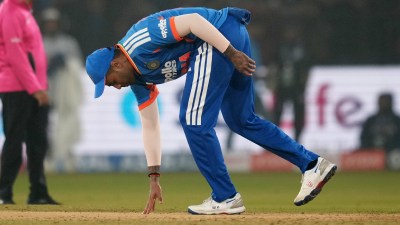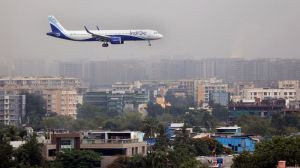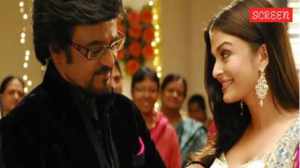Young and angry at Shahbagh
Many of the youngsters who turned up to protest at Dhakas Shahbagh Square were born after Bangladeshs War of Liberation.
Many of the youngsters who turned up to protest at Dhakas Shahbagh Square were born after Bangladeshs War of Liberation. Subrata Nagchoudhury visits the countrys protest hub to know what spurs them on.
Shahbagh Square is not Tahrir Square. It is not Ramlila Maidan either. For the thousands of youngsters who squeezed into every inch of space at Dhakas central roundabout,piercing the air with cries of Fashi Chai,Fashi Chai (Let them hang),this was their own movement,their own moment. Many of them were born after Bangladeshs tumultuous War of Liberation in 1971 and had grown up hearing stories of the struggle. But now,those stories had come alive and the youth had a role in them of settling a 42-year-old unfinished agenda of creating a secular,safe Bangladesh.
Its February 21 or Ekushey February and the atmosphere at Shahbagh Square is charged. An estimated 5 million protesters have turned up at the roundabout. The day has its emotional significance. It was on this day 60 years ago,when Bangladesh was still part of Pakistan,that a number of students campaigning for the recognition of Bangla as one of the state languages were gunned down.
Bonya Mirza says she had to be here this day. Mirza was born in 1975,four years after Bangladeshs War of Liberation. A film and television artiste,Bonya has acted in several movies based on the freedom struggle,but this,she says,is a totally different experience. This is one struggle that has created a space for everyone to share,trust and communicate,though no one knows how it will end. Its amazing how we all draw our inspiration from a struggle that we were not even born to experience and witness, she says.
Jamaluddin Chowdhury was born a year after the war. Born in a family of freedom fighters in Chandpur near Mirpur,Chowdhury says that in his growing up years,he was haunted by the idea of true freedom. Its this idea that has been defeated,now that Pakistani moles and war criminals such as Abdul Kader Mollah have been given life imprisonment,not death. I exploded in anger at the verdict, he says,referring to the February 4 sentencing of Mollah,one of the 14 people who have been accused of war crimes during Bangladeshs struggle for liberation from Pakistan. Sporting a headband that calls for death to Rajakaars (war criminals),Chowdhury has been manning the central command camp office of the Mukti Joddha Projonmo Committee (Freedom Fighters Generation Committee) for the past 16 days. Chowdhury isnt new to protests. For the last 12 years,he has attended meetings,conferences,processions and rallies that have demanded punishment to war criminals,but hasnt been part of anything as emotive as the one at Shahbagh Square.
The protests began on February 5 this year,a day after Mollah,assistant secretary-general of Bangladeshs largest Islamic party,the Jamaat-e-Islami,walked out of a war crimes tribunal in Dhaka,turned to the waiting press,smiled and flashed a victory sign. Mollah had reasons to be happy for someone convicted in five out of six cases of murder,genocide and other crimes against humanity against him,he had defied all predictions and got away with a life term of 15 years. Angry at the verdict,a group of 25 bloggers began an online campaign seeking death for Mollah. They set up a camp at Shahbagh and the next day,on February 6,a group of students from the nearby Dhaka University marched to the square to express their solidarity. Soon,the protests exploded into what Shahbagh Square has come to represent,even earning the square a new name,Projonmo Chottor (New Generation Roundabout).
***
Anjan Roy,a core committee member of the agitation and a popular television talk show host,says the movement has gained momentum with every passing day,all the while retaining its apolitical character. The spirit of the freedom struggle was gathering dust and we decided to shake it up. We are not here to occupy power by chanting slogans of Muslim brotherhood and unity. We are here as a watchdog to make sure the government keeps its electoral promise of giving exemplary punishment to the war criminals, says Roy.
Imran H Sarkar,a 31-year-old doctor,is one of the more popular faces to have emerged from the movement. This movement did not have any leader. It derived its strength from a common demand for extreme punishment to the war criminals, he says.
Indeed,there is no one leader who stands out among this mass uprising; almost everyone is willing to lead. Hafijul Islam,Ilias Melu,Sonia Akhtar,all class VII students,are among the young mukti joddhas (freedom fighters) dressed in army fatigues. They put up mock shows till late into the night and scream their lungs out whenever the adults around them raise slogans of Hang the Rajakaars,Jamaat-e-Islami,made in Pakistan and Jwalo,Jwalo,agun Jwalo.
Under a tarpaulin canopy,a group of about 50 people sit in rows staring at their laptop screens. They are the cyber joddhas or the cyber warriors,mostly students from Dhaka University who work in shifts to scan blogs run by the rival Jamaat camp. The warriors have divided themselves into groups,each representing different student outfits one for the Aam Janata,another calls itself TSC (for Teachers-Students Corner),yet another had branded itself Slogan 71.
Masud and Kazi Anik of Aam Janata take a minutes break to say that they have been constantly monitoring the Jamaat blog site,Basher Kella,and countering their campaign. Its a virtual war,but a war nonetheless. We are constantly engaged in hacking the rival camps sites and blogs, says Kazi.
The Jamaat is engaged in a smear campaign and have been saying that suspicious things happen at the Shahbagh site at night since a large number of teenage girls participate in the protests and stay back all night. We are calling their bluff by spreading the spirit behind the protests, says Muktadiur Rahman Shimul,a final-year student of chemistry at Dhaka University.
Though the protesters have consistently claimed to be apolitical,the Shahbagh Square protests are seen to have the ruling Awami Leagues support and blessings. Khondokar Mosharaf Hossain,spokesman of the opposition Bangladesh Nationalist Party,has accused the League of engineering the movement to divert attention from its growing failures and corruption.
The two main demands of the protesters death penalty to war criminals and banning of the Jamaat-e-Islami are both on the Awami Leagues 2008 election manifesto. Though the Awami League has cracked down on the Jamaat in the past two years,it has stopped short of banning it.
Md. Mahaboob Ul Hanif,one of the top leaders of the Awami League,vehemently denies that the protests are an Awami League backdoor venture. There were promises made by our party that remained unfulfilled and this agitation has created the public opinion for us to pursue those demands more vigorously. It is a movement of the young generation and has no political colour, says Hanif.
***
If the projonmo or the new generation is the face of Shahbagh,among the protesters are also several veteran freedom fighters for whom the venue and the protests are a reminder of their own heady days of struggle.
A little distance away from the main stage,Nayem Jahangir,secretary general of the Bangladesh Freedom Fighters Sansad,shares a camp with a host of other freedom fighters.
Jahangir,who fought the Liberation War from Sector-11 in Jamalpur district,says that while the war was won,the goals remain unattained. We had two goals to achieve freedom and to have a secular,equal society in terms of politics,economics and administration. But all these years,the dream remained unrealised as the agents of Pakistanis continued to be in Bangladesh, says Jahangir.
Syed Ahmed,another freedom fighter,has a score to settle. His brother Col Abu Taher was hanged to death in 1976 during General Ziaur Rahmans reign. My brother wasnt killed by the Pakistani army,but by the stooges they left behind. General Rahman was one of them. While the families of the Liberation War fighters were tortured after Independence,the Jamaat continues to wield economic and political clout in Bangladesh, he says.
Ahmed says that over the years,the spirit of the Liberation War was dying out,till Shahbagh Square happened. We are overwhelmed at the commitment of this new generation of youths who are pushing for what we have not been able to achieve. They are as dedicated as we were,if not more,and are more competent and forward looking. This is a common space to communicate with this new generation, he says.
In the dock
On February 4,one of the two war crimes tribunal set up by the Bangladesh government in 2011,convicted Abdul Kader Mollah and Abul Kalam Azad alias Bachchu of war crimes. While Mollah was sentenced to life imprisonment (a term of 15 years),Bachchu,who is said to have fled to Pakistan,was sentenced to death in absentia. An estimated three million people were killed during the Liberation War. Human rights groups have urged the government to ensure the trials are carried out in accordance with international standards. The people indicted deny the charges and opposition leaders and the Jamaat-e-Islami accuse the government of political vendetta. Of the 14 people in the dock,the war crimes tribunal has so far convicted only two of them,Mollah and Bachchu. The war criminals:
Abdul Kader Mollah
It was his conviction on February 4 that triggered the Shahbagh agitation. Though he was charged with genocide,murder and other crimes,and the court declared him guilty in three of the five cases,he was only sentenced to 15 years in jail. The protesters want him to be sentenced to death. Mollah was accused of killing 344 civilians in 1971,earning him the nickname Butcher of Mirpur. In his early days,Mollah joined Islami Chhatra Sangha,the student wing of the Jamaat,and was its president while in Dhaka University.
Abul Kalam Azad alias Bachchu
The war crimes tribunal awarded death penalty to Bachchu in absentia for committing crimes against humanity during the Liberation War. The 66-year-old Jamaat leader was found guilty of committing crimes against humanity,including confinement,murder,rape and genocide,says the judgment. Since he is believed to have fled to Pakistan,the tribunal ordered that capital punishment will be carried out when he is arrested or when he surrenders before the tribunal.
Delawar Hossain Sayedee
A former member of parliament of the Bangladesh National Assembly,Sayedee is one of the alleged war criminals. He was a Jamaat MP from 1996 to 2008 and continues to be one of its most prominent leaders. He is accused of committing crimes against humanity during the 1971 Liberation War and is currently in prison. Sayedee is accused of killing more than 50 people and of indulging in arson,rape and looting.
Motiur Rahman Nizami
The prosecution has charged the Jamaat leader with war crimes. He is accused of genocide and other crimes allegedly carried out during the 1971 war. Earlier this month,the prosecution charged Nizami with 16 cases of genocide,rape,murder,arson and looting. His trial is set to begin soon.
Salahuddin Quader Chowdhury
A four-term MP and a leader of the Bangladesh Nationalist Party,Chowdhury is currently being tried by the tribunal. His father Fazlul Quader Chowdhury was a Speaker of the Pakistan National Assembly. He is also known as SaQa Chowdhury and served as an adviser of parliamentary affairs to Prime Minister Khaleda Zia while she was PM between 2001 and 2006. He is currently in prison for alleged war crimes.
- 01
- 02
- 03
- 04
- 05






























